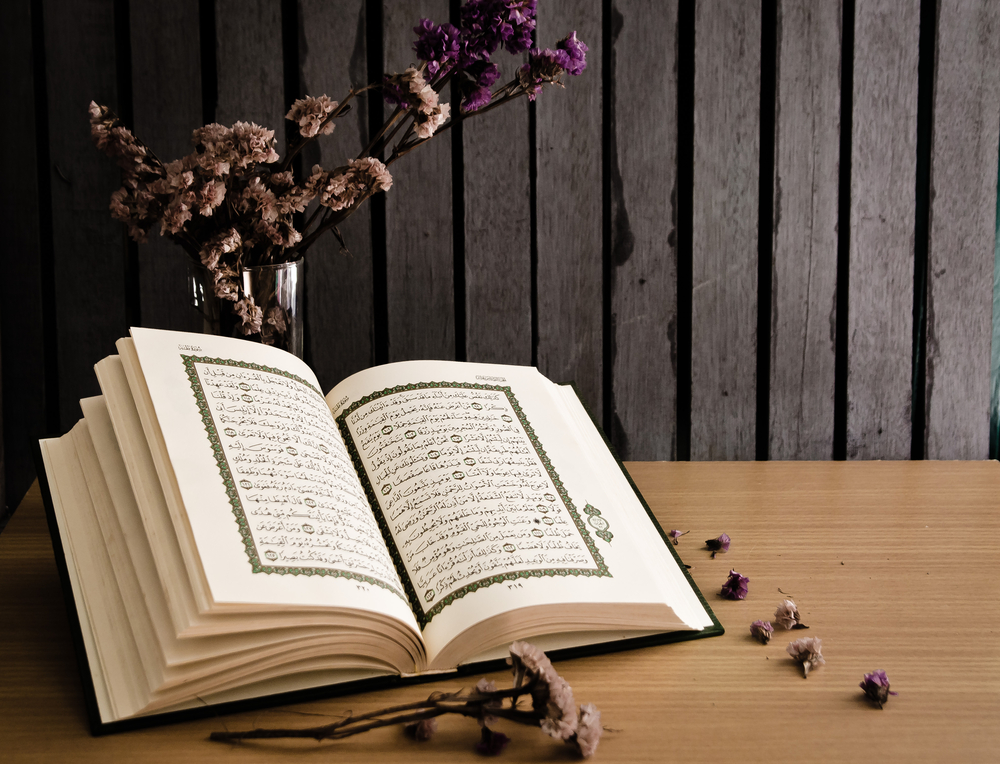Table of Contents
ToggleThe Revelation of the Qur’an and Its Descent Upon Prophet Muhammad (peace be upon him)

The revelation of the Qur’an and its descent upon Prophet Muhammad (peace be upon him) is one of the greatest events in Islamic history. It is the holy book sent by Allah Almighty to guide all of humanity. The Qur’an began its revelation during the Night of Decree (Laylat al-Qadr) in the month of Ramadan, the night of which Allah said:
“لَيْلَةُ الْقَدْرِ خَيْرٌ مِنْ أَلْفِ شَهْرٍ” (سورة القدر، الآية 3)
“The Night of Decree is better than a thousand months.” (Surah Al-Qadr, verse 3)
The revelation was delivered to the Prophet through the angel Gabriel, and this process began when the Prophet was in the Cave of Hira, worshipping and contemplating the universe.
The Virtue of Reciting the Qur’an
The virtue of reciting the Qur’an is immense and cannot be measured. The Prophet (peace be upon him) said: “Whoever recites a letter from the Book of Allah will receive a reward, and the reward will be tenfold” (Narrated by Al-Tirmidhi). This means that every letter recited from the Qur’an brings a great reward from Allah, highlighting the enormous virtue of reading it.
The Importance of Learning and Reflecting on the Qur’an
Allah says:
“أَفَلَا يَتَدَبَّرُونَ الْقُرْآنَ أَمْ عَلَىٰ قُلُوبٍ أَقْفَالُهَا” (سورة محمد، الآية 24)
“Do they not reflect upon the Qur’an, or are there locks upon their hearts?” (Surah Muhammad, verse 24)
This urges us to reflect upon the verses of the Qur’an and understand its meanings, rather than merely reading it. Reflection deepens the wisdom and guidance contained in the Qur’an, leading to personal and social reform for Muslims.
The Importance of Reciting the Qur’an with Tajweed
Tajweed is the art of reciting the Qur’an correctly, according to how the Prophet (peace be upon him) received it from Gabriel. Allah says:
“وَرَتِّلِ الْقُرْآنَ تَرْتِيلًا” (سورة المزمل، الآية 4)
“Recite the Qur’an with measured recitation.” (Surah Al-Muzzammil, verse 4)
This instructs us to read the Qur’an slowly and with proper tajweed rules. Tajweed is essential to preserving the Qur’anic text from distortion and ensures the proper pronunciation of its letters, just as they were revealed to the Prophet.
The Revelation of the Qur’an in Arabic
Allah chose the Arabic language for the revelation of the Qur’an, and this choice carries profound wisdom. The Arabic language is rich, vast, and capable of expressing nuanced meanings. Allah says:
“إِنَّا أَنزَلْنَاهُ قُرْآنًا عَرَبِيًّا لَّعَلَّكُمْ تَعْقِلُونَ” (سورة يوسف، الآية 2)
“Indeed, We have sent it down as an Arabic Qur’an so that you might understand.” (Surah Yusuf, verse 2)
Thus, reading the Qur’an in Arabic and understanding its meanings in this language adds great value to the reader.
The Virtue of Reciting Every Letter of the Qur’an
Reciting the Qur’an is unlike any other reading, as every letter carries a great reward, as mentioned by the Prophet (peace be upon him). This encourages us to read the Qur’an daily, strive to understand it, and live by it, as this is the way to gain Allah’s pleasure and draw closer to Him.
In conclusion, the Qur’an is the primary source of guidance and peace in the lives of Muslims. Learning, reflecting upon, and reciting it correctly are among the greatest deeds a Muslim can perform.
Categories:
– The Revelation of the Qur’an
– The Revelation to Prophet Muhammad (peace be upon him)
– The Virtue of Reciting the Qur’an
– The Importance of Reflecting on the Qur’an
– Rules of Tajweed in the Qur’an
– The Arabic Language in the Qur’an
– The Reward for Reciting the Qur’an




